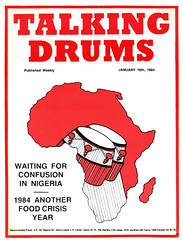F.A.O. Alert on Food Supply in West Africa
By a correspondent
The report notes that the provision of relief to the drought stricken areas will only minimise immediate human suffering but not solve the basic problem of insulating these areas from recurring disasters...The number of countries in Africa which are considered to be in need of exceptional international support has risen from seventeen to twenty two, of which ten are West African.
A situation report number two of the Food and Agriculture Organisation and World Food Programme lists the West African countries as Ghana, Chad, Cape Verde, Benin, Togo, Guinea, Gambia, Mali, Mauritania and Senegal. In two of these, Ghana and Chad the problem is described as most acute where the stocks held by the governments, private traders and farmers have been exhausted or are expected to be exhausted.
Three main reasons were identified for this shortfall. First, a number of countries were unable to cover their food deficits by commercial imports, due to deterioration of their balance of payments.
In several countries this caused actual imports in 1982/83 to be reduced from the previous year, despite increased needs.
Second, food aid pledges for the period did not increase significantly; in fact food aid fell by over 100,000 tons.
Finally, the supplies required in a number of countries could not be distributed due to transport difficulties, internal strife and delays in the arrival of pledged food aid.
The cereals production in 1983 is particularly poor for most of the countries, having been adversely affected by drought or late or erratic rains. The shortfall has been much greater in 1983 than in 1982 for whereas the total production of the 22 countries in 1982 was 14.1 million tons, that of 1983 was only 12.9 million.
But the biggest constraint to agricultural rehabilitation in the affected areas even when the weather conditions are normal is the lack of quality seeds, tools to resume agricultural operations and inputs required to improve yields.
The report therefore requests for a modest investment of international assistance in the supply of seed and agricultural inputs for selected countries to help reduce their future food import requirements.
The report however noted that the provision of relief to the drought stricken areas will only minimize immediate human suffering but not solve the basic problem of insulating these areas from recurring disasters which result from ecological damage due to prolonged neglect of the environment.
It therefore proposes preventive measures related to drought in the long-term physical and economic planning process in the countries. It said that those tropical and subtropical countries which have large drought-prone areas require additional investments in programmes designed to restore the disturbed ecological balance, through the integrated development of agricultural and allied sectors of the rural economy, including conservation, development and the optimal use of the available land, water, livestock and human resources.
One area described as an important element of disaster preparedness in the countries is the establishment of seed reserves which could be drawn upon during the sowing and reseeding period. Seed banks of untreated seeds grown in rainfed areas may need to be built up within the framework of the national food security systems and may be stored until their cut-off dates for sowing and the unused balance can be released for consumption as food or feed.
Such a measure the FAO/WFP indicated would be preferable to searching for supplies of seeds from overseas in times of acute need and subsequently estimates that an assistance of about 37 million dollars would be required to build the seed reserves and related facilities.
Meanwhile the special Task Force of the FAO/WFP has estimated the total food aid requirements of the twenty two countries in 1983/84 to be 3.2 million tons of which 600,000 tons has so far been pledged by donors.
But the task force noted that in order to maintain supplies in the months immediately ahead, a minimum of 1 million tons of additional food aid is required.
